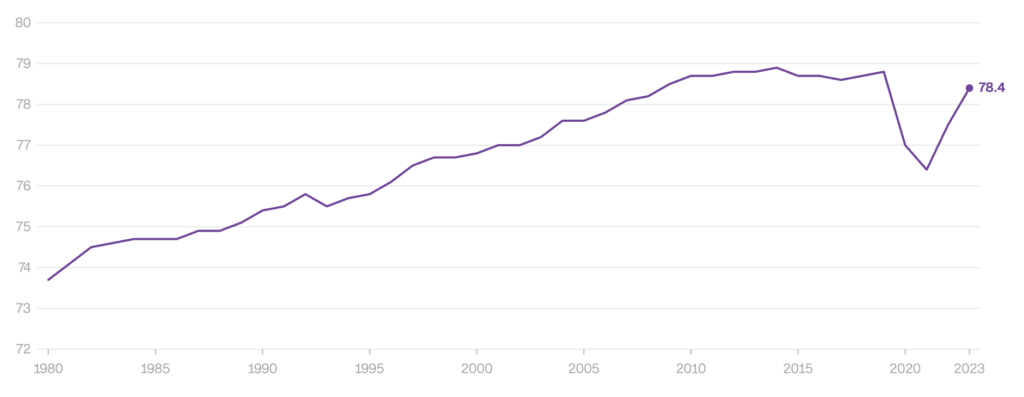Life expectancy in the United States is rising nearly as quickly as it fell at the start of the Covid-19 pandemic as deaths from Covid-19 and drug overdoses drop.
After falling 2.4 years between 2019 and 2021, life expectancy rose by more than a year in 2022, and new data from the US Centers for Disease Control and Prevention shows that it increased by nearly another full year in 2023.
People born in 2023 are now estimated to live 78.4 years, according to the CDC. That’s still shy of the 78.8-year life expectancy from 2019, but it’s a significant improvement driven by lower death rates in each of the 10 leading causes of death.
US life expectancy increased by nearly a year in 2023
Two years of rebound have brought estimates back near pre-pandemic levels.
The death rate for Covid-19 – about 12 deaths for every 100,000 people in 2023, when adjusted for different age distributions in population groups – dropped to about a quarter of what it was in 2022, bringing it from the fourth leading cause of death to the 10th.
Life expectancy at birth, in years

The death rate for Covid-19 – about 12 deaths for every 100,000 people in 2023, when adjusted for different age distributions in population groups – dropped to about a quarter of what it was in 2022, bringing it from the fourth leading cause of death to the 10th.
“One of the major reasons we saw such a big drop in life expectancy was the massive death toll from Covid. So once we started to get control of Covid-19 mortality through vaccination, it was expected that life expectancy would start climbing back up,” said Dr. Steven Woolf, director emeritus of the Virginia Commonwealth University Center on Society and Health. He did not review the new CDC data but has extensively researched life expectancy trends.
Drug overdose deaths also dropped 4% between 2022 and 2023, CDC data shows. The drop — from 32.6 deaths for every 100,000 people in 2022 to 31.3 in 2023 — marks the first decrease in more than five years.
People ages 35 to 44 are most likely to die from a drug overdose, with rates nearly double the overall age-adjusted rate.
Reducing mortality in causes that particularly affect younger age groups such as this can have an outsized effect on life expectancy, Woolf said.
“Drug overdose deaths has been a major player in life expectancy trends and all-cause mortality,” he said. “Getting some significant reduction in drug overdose deaths can have a very positive effect on our health trends.”
Promising trends in newer provisional data show that overdose deaths have continued on an ever-sharper downward curve in recent months, and there have been thousands fewer Covid-19 deaths this year than at the same point last year.
The death rate from heart disease, the most common cause of death in the US, dropped 3% between 2022 and 2023. Death rates from diabetes, kidney disease and chronic liver disease decreased more than 5%, while decreases for cancer, stroke, chronic lower respiratory diseases and Alzheimer’s disease were smaller.
But Woolf warns that bringing US life expectancy back to pre-pandemic levels shouldn’t be the goal. His research shows that the country has been falling behind on life expectancy for decades and that it’s rebounding slower than many other countries. Other research suggests that US life expectancy may stall by 2050.
“We had concerns about US life expectancy for the decade preceding the pandemic, because there had been no significant increase in life expectancy while it was continuing to climb in other countries. And the causes of death responsible for that did not go away during the pandemic,” Woolf said.
“It’s important for Americans to understand that getting back to where we were before the pandemic is still not a very good place. We’re hardly out of the woods,” he said. “And that difference in life expectancy between the United States and other countries means, in plain English, that Americans are dying at much higher rates than their peers in other high-income countries.”
Stark disparities persist within the US, too.
Women can still expect to live more than five years longer than men — the life expectancy at birth for females in 2023 was 81.1 years, compared with 75.8 years for males — but the gap has been closing.
And death rates decreased for all racial and ethnic groups that were analyzed for 2023, but age-adjusted rates were still highest by far for American Indian men and Black men. Death rates were also higher than average for American Indian women, White men and Black women.
After a notable increase in infant mortality in 2022, rates stayed flat in 2023, the new CDC data shows. But rates of congenital malformations and low birth weights — the two leading causes of infant death in the US — both ticked up. Other research has found that births have increased in states with abortion bans, and experts say that some of that increase is linked to a disproportionate rise in the number of women who are carrying fetuses with lethal congenital anomalies to term.
Death rates decreased for all other age groups, according to the new CDC report.
But mortality among children and adolescents has been increasing in recent years, Woolf said, and death rates among the youngest in the US are well higher than they are in other peer nations.
“Getting back to a higher life expectancy means that we’re not seeing as massive a death toll as we had been seeing during the pandemic,” he said, but “American children are less likely to survive to adulthood than children in other countries. So getting back to that place should not leave the population complacent.”
By Deidre McPhillips, CNN

